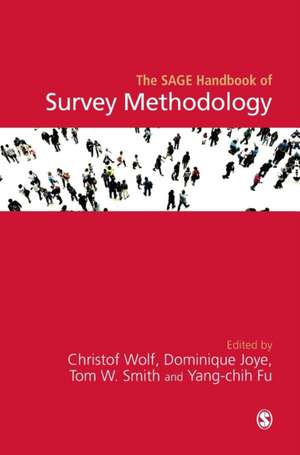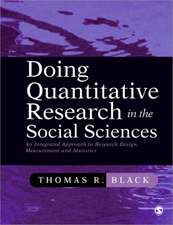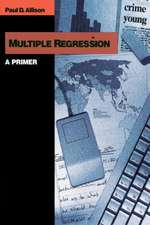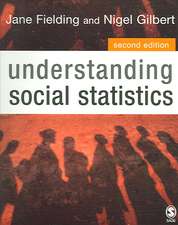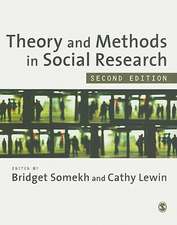The SAGE Handbook of Survey Methodology
Editat de Christof Wolf, Dominique Joye, Tom Smith, Yang-chih Fuen Limba Engleză Hardback – 24 iul 2016
The handbooktakes a global approach, with a team of international experts looking at localand national specificities, as well as problems of cross-national, comparativesurvey research. The chapters are organized into seven major sections, each ofwhich represents a stage in the survey life-cycle:
- Surveys and Societies
- Planning a Survey
- Measurement
- Sampling
- Data Collection
- Preparing Data for Use
- Assessing and Improving Data Quality
Preț: 1126.08 lei
Preț vechi: 1542.58 lei
-27% Nou
Puncte Express: 1689
Preț estimativ în valută:
215.48€ • 222.30$ • 179.82£
215.48€ • 222.30$ • 179.82£
Carte tipărită la comandă
Livrare economică 27 martie-10 aprilie
Preluare comenzi: 021 569.72.76
Specificații
ISBN-13: 9781446282663
ISBN-10: 144628266X
Pagini: 740
Dimensiuni: 184 x 246 x 43 mm
Greutate: 1.45 kg
Ediția:1
Editura: SAGE Publications
Colecția Sage Publications Ltd
Locul publicării:London, United Kingdom
ISBN-10: 144628266X
Pagini: 740
Dimensiuni: 184 x 246 x 43 mm
Greutate: 1.45 kg
Ediția:1
Editura: SAGE Publications
Colecția Sage Publications Ltd
Locul publicării:London, United Kingdom
Recenzii
This exciting new handbook provides a comprehensive guide to conducting survey research studies. Authored by a distinguished set of experts from across the globe, chapters cover all phases of survey projects—from conceiving, designing and planning, through sampling, measurement, and data collection, to post-fieldwork data processing, data augmentation, and quality assessment. Extensive attention to multi-national or cross-cultural survey projects is a special asset: both challenges to comparability in such studies, and current practices to achieving it in vital domains including sampling, translation, and harmonization of data over space and time, are treated in depth.
The environment for conducting surveys has changed substantially in the last several decades. New approaches to data collection and data dissemination are required, but the approaches must be adapted depending on country and culture. This Sage handbook is an up-to-date reference that covers virtually all steps in the survey life cycle. It contains methodological topics like survey modes, surveying in multicultural and cross-cultural contexts, questionnaire design and pretesting, and responsive design, along with statistical topics like sampling, weighting, analysis of complex surveys, and record linkage. Coverage of distinctive areas, like ethical issues, surveys in conflict areas, question translation, and harmonization of questions across cultures, also set this book apart from others. The handbook will be a valuable reference for survey practitioners and other professionals who need a broad overview of the many steps required to conduct high quality surveys.
The new Sage Handbook broadens our view of survey research by including topics important for data sharing and reuse. Data are expensive public resources, and we need more attention on issues like disclosure risk, harmonization, life-cycle documentation, and preservation.
"The SAGE Handbook of Survey Methodology is a useful resource for researchers and individuals who want to learn about the process of surveying. In an era where surveying is so hotly debated, the handbook comes at an important moment in history. This book is recommended for academic libraries."
"This thorough volume provides extensive information on understanding and creating surveys. Its 43 chapters cover important topics such as types of surveys (face-to-face, mail, internet), designing questions for surveys, sampling, administering surveys, handling ethical issues, combining administrative and survey data, and analyzing data from surveys... Summing Up: Highly recommended. Faculty and professionals"
The SAGE Handbook of Survey Methodology is a valuable compendium and reference reflecting a broad range of expertise from the survey world and beyond.The authors of the 43 chapters represent a diverse group of institutions, mainly from the United States and Europe, and bring a deep expertise on their given “assignments. For those whose research depends on the quality of survey data, especially in an international context, the Handbook is a solid and dependable anchor.
The environment for conducting surveys has changed substantially in the last several decades. New approaches to data collection and data dissemination are required, but the approaches must be adapted depending on country and culture. This Sage handbook is an up-to-date reference that covers virtually all steps in the survey life cycle. It contains methodological topics like survey modes, surveying in multicultural and cross-cultural contexts, questionnaire design and pretesting, and responsive design, along with statistical topics like sampling, weighting, analysis of complex surveys, and record linkage. Coverage of distinctive areas, like ethical issues, surveys in conflict areas, question translation, and harmonization of questions across cultures, also set this book apart from others. The handbook will be a valuable reference for survey practitioners and other professionals who need a broad overview of the many steps required to conduct high quality surveys.
The new Sage Handbook broadens our view of survey research by including topics important for data sharing and reuse. Data are expensive public resources, and we need more attention on issues like disclosure risk, harmonization, life-cycle documentation, and preservation.
"The SAGE Handbook of Survey Methodology is a useful resource for researchers and individuals who want to learn about the process of surveying. In an era where surveying is so hotly debated, the handbook comes at an important moment in history. This book is recommended for academic libraries."
"This thorough volume provides extensive information on understanding and creating surveys. Its 43 chapters cover important topics such as types of surveys (face-to-face, mail, internet), designing questions for surveys, sampling, administering surveys, handling ethical issues, combining administrative and survey data, and analyzing data from surveys... Summing Up: Highly recommended. Faculty and professionals"
The SAGE Handbook of Survey Methodology is a valuable compendium and reference reflecting a broad range of expertise from the survey world and beyond.The authors of the 43 chapters represent a diverse group of institutions, mainly from the United States and Europe, and bring a deep expertise on their given “assignments. For those whose research depends on the quality of survey data, especially in an international context, the Handbook is a solid and dependable anchor.
Cuprins
Part I: Basic Principles
1. Introduction - Yang-chih Fu, Dominique Joye, Tom W. Smith and Christof Wolf
2. Survey standards - Tom W. Smith
3. Total survey error: a paradigm for survey methodology - Lars E. Lyberg and Herbert F. Weisberg
4. Challenges of comparative survey research - Timothy P. Johnson and Michael Braun
Part II: Surveys and Societies
5. Surveys and society - Claire Durand
6. Defining and assessing survey climate - Geert Loosveldt and Dominique Joye
7. The Ethical issues of survey and market research - Kathy Joe, Finn Raben and Adam Phillips
8. Observations on the historical development of polling - Kathleen A. Frankovic
Part III: Planning a Survey
9. Research question and designs for survey research - Ben Jann and Thomas Hinz
10. Total survey error paradigm: : Theory and Practice - Paul P. Biemer
11. Survey mode or survey modes? - Edith de Leeuw and Jernej Berzelak
12. Surveying in multi-cultural and multi-national contexts - Beth-Ellen Pennell and Kristen Cibelli-Hibben
13. Surveys in societies in turmoil - Zeina N. Mneimneh, Beth-Ellen Pennell, Jennifer Kelley and Kristen Cibelli-Hibben
Part IV: Measurement
14. What does Measurement Mean in a Survey Context? - Jaak Billiet
15. Cognitive models of answering processes - Kristen Miller and Gordon B. Willis
16. Designing questions and questionnaires - Jolene D. Smyth
17. Creating a good question: how to use cumulative experience - Melanie Revilla, Diana Zavala-Rojas and Willem Saris
18. Designing a mixed-mode survey - Don A. Dillman and Michelle L. Edwards
19. The Translation of Measurement Instruments for Cross-cultural Surveys - Dorothée Behr and Kuniaki Shishido
20. When Translation is not Enough: Background Variables in Comparative Surveys - Silke Schneider, Dominique Joye and Christof Wolf
Part V: Sampling
21. Basics of sampling for survey research - Yves Tillé and Alina Matei
22. Nonprobability sampling - Vasja Vehovar, Vera Toepoel and Stephanie Steinmetz
23. Special challenges of sampling for comparative surveys - Siegfried Gabler and Sabine Häder
Part VI: Data Collection
24. Questionnaire pretesting - Gordon B. Willis
25. Survey fieldwork - Annelies G. Blom
26. Responsive and adaptive designs - François Laflamme and James Wagner
27. Unit nonresponse - Ineke A. L. Stoop
28. Incentives as a possible measure to increase response rates - Michèle Ernst Stähli and Dominique Joye
Part VII: Preparing Data for Use
29. Documenting Survey Data Across the Life Cycle - Mary Vardigan, Peter Granda and Lynette Hoelter
30. Weighting: principles and practicalities - Pierre Lavallée and Jean-François Beaumont
31. Analysis of data from stratified and clustered surveys - Stephanie Eckman and Brady T. West
32. Analytical Potential Versus Data Confidentiality – Finding the Optimal Balance - Heike Wirth
33. Harmonizing Survey Questions Between Cultures and Over Time - Christof Wolf, Silke L. Schneider, Dorothée Behr and Dominique Joye
Part VIII: Assessing and Improving Data Quality
34. Survey data quality and measurement precision - Duane F. Alwin
35. Nonresponse error: detection and correction - Jelke Bethlehem and Barry Schouten
36. Response styles in surveys: understanding their causes and mitigating their impact - Caroline Roberts
37. Dealing with missing values - Martin Spiess
38. Another Look at Survey Data Quality - Victor Thiessen and Jörg Blasius
39. Assessment of cross-cultural comparability - Jan Cieciuch, Eldad Davidov, Peter Schmidt and René Algesheimer
Part IX: Further Issues
40. Data preservation, secondary analysis, and replication: learning from existing data - Lynette Hoelter, Amy Pienta and Jared Lyle
41. Record linkage - Rainer Schnell
42. Supplementing cross-national surveys with contextual data - Jessica Fortin-Rittberger, David Howell, Stephen Quinlan and Bojan Todosijevic
43. The Globalization of surveys - Tom W. Smith and Yang-chih Fu
1. Introduction - Yang-chih Fu, Dominique Joye, Tom W. Smith and Christof Wolf
2. Survey standards - Tom W. Smith
3. Total survey error: a paradigm for survey methodology - Lars E. Lyberg and Herbert F. Weisberg
4. Challenges of comparative survey research - Timothy P. Johnson and Michael Braun
Part II: Surveys and Societies
5. Surveys and society - Claire Durand
6. Defining and assessing survey climate - Geert Loosveldt and Dominique Joye
7. The Ethical issues of survey and market research - Kathy Joe, Finn Raben and Adam Phillips
8. Observations on the historical development of polling - Kathleen A. Frankovic
Part III: Planning a Survey
9. Research question and designs for survey research - Ben Jann and Thomas Hinz
10. Total survey error paradigm: : Theory and Practice - Paul P. Biemer
11. Survey mode or survey modes? - Edith de Leeuw and Jernej Berzelak
12. Surveying in multi-cultural and multi-national contexts - Beth-Ellen Pennell and Kristen Cibelli-Hibben
13. Surveys in societies in turmoil - Zeina N. Mneimneh, Beth-Ellen Pennell, Jennifer Kelley and Kristen Cibelli-Hibben
Part IV: Measurement
14. What does Measurement Mean in a Survey Context? - Jaak Billiet
15. Cognitive models of answering processes - Kristen Miller and Gordon B. Willis
16. Designing questions and questionnaires - Jolene D. Smyth
17. Creating a good question: how to use cumulative experience - Melanie Revilla, Diana Zavala-Rojas and Willem Saris
18. Designing a mixed-mode survey - Don A. Dillman and Michelle L. Edwards
19. The Translation of Measurement Instruments for Cross-cultural Surveys - Dorothée Behr and Kuniaki Shishido
20. When Translation is not Enough: Background Variables in Comparative Surveys - Silke Schneider, Dominique Joye and Christof Wolf
Part V: Sampling
21. Basics of sampling for survey research - Yves Tillé and Alina Matei
22. Nonprobability sampling - Vasja Vehovar, Vera Toepoel and Stephanie Steinmetz
23. Special challenges of sampling for comparative surveys - Siegfried Gabler and Sabine Häder
Part VI: Data Collection
24. Questionnaire pretesting - Gordon B. Willis
25. Survey fieldwork - Annelies G. Blom
26. Responsive and adaptive designs - François Laflamme and James Wagner
27. Unit nonresponse - Ineke A. L. Stoop
28. Incentives as a possible measure to increase response rates - Michèle Ernst Stähli and Dominique Joye
Part VII: Preparing Data for Use
29. Documenting Survey Data Across the Life Cycle - Mary Vardigan, Peter Granda and Lynette Hoelter
30. Weighting: principles and practicalities - Pierre Lavallée and Jean-François Beaumont
31. Analysis of data from stratified and clustered surveys - Stephanie Eckman and Brady T. West
32. Analytical Potential Versus Data Confidentiality – Finding the Optimal Balance - Heike Wirth
33. Harmonizing Survey Questions Between Cultures and Over Time - Christof Wolf, Silke L. Schneider, Dorothée Behr and Dominique Joye
Part VIII: Assessing and Improving Data Quality
34. Survey data quality and measurement precision - Duane F. Alwin
35. Nonresponse error: detection and correction - Jelke Bethlehem and Barry Schouten
36. Response styles in surveys: understanding their causes and mitigating their impact - Caroline Roberts
37. Dealing with missing values - Martin Spiess
38. Another Look at Survey Data Quality - Victor Thiessen and Jörg Blasius
39. Assessment of cross-cultural comparability - Jan Cieciuch, Eldad Davidov, Peter Schmidt and René Algesheimer
Part IX: Further Issues
40. Data preservation, secondary analysis, and replication: learning from existing data - Lynette Hoelter, Amy Pienta and Jared Lyle
41. Record linkage - Rainer Schnell
42. Supplementing cross-national surveys with contextual data - Jessica Fortin-Rittberger, David Howell, Stephen Quinlan and Bojan Todosijevic
43. The Globalization of surveys - Tom W. Smith and Yang-chih Fu
Descriere
With a particular focus on the complexities of cross-national, comparative survey research, explored by a team of international experts at local and national levels, this exciting new handbook provides readers with a cutting-edge resource.
